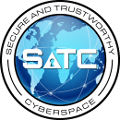Joint & Special Programs
 C U R R E N T J O I N T A N D S P E C I A L S E C U R I T Y & P R I V A C Y P R O G R A M S
C U R R E N T J O I N T A N D S P E C I A L S E C U R I T Y & P R I V A C Y P R O G R A M S 
![]()
The US National Science Foundation (NSF) and the US-Israel Binational Science Foundation (BSF) have signed a Memorandum of Understanding (MOU) on Research Cooperation. The MOU provides an overarching framework to encourage collaboration between US and Israeli research communities and sets out the principles by which jointly supported activities might be developed. The MOU provides for an international collaboration arrangement whereby US researchers may receive funding from the NSF and Israeli researchers may receive funding from the BSF.
https://www.nsf.gov/pubs/2017/nsf17020/nsf17020.jsp

![]()
Semi-Conductor Research Corporation (SRC) and the National Science Foundation (NSF) are jointly supporting the Secure, Trustworthy, Assured and Resilient Semiconductors and Systems (STARSS) program. Nine research awards were granted to 10 universities. The awards support research at the circuit, architecture and system levels on new strategies, methods and tools to decrease the likelihood of unintended behavior or access; increase resistance and resilience to tampering; and improve the ability to provide authentication throughout the supply chain and in the field.
 P R I O R J O I N T A N D S P E C I A L S E C U R I T Y & P R I V A C Y P R O G R A M S
P R I O R J O I N T A N D S P E C I A L S E C U R I T Y & P R I V A C Y P R O G R A M S 
![]() The goal of this partnership between NSF and Intel on Cyber-Physical Systems Security and Privacy (CPS-Security) is to foster novel, transformative, multidisciplinary approaches that ensure the security of current and emerging cyber-physical systems, taking into consideration the unique challenges present in this environment relative to other domains with cybersecurity concerns. https://www.nsf.gov/pubs/2014/nsf14571/nsf14571.htm
The goal of this partnership between NSF and Intel on Cyber-Physical Systems Security and Privacy (CPS-Security) is to foster novel, transformative, multidisciplinary approaches that ensure the security of current and emerging cyber-physical systems, taking into consideration the unique challenges present in this environment relative to other domains with cybersecurity concerns. https://www.nsf.gov/pubs/2014/nsf14571/nsf14571.htm

![]() In fall 2015, the U.S. National Science Foundation (NSF) and the Netherlands Organisation for Scientific Research (NWO) jointly funded a workshop between U.S. and Dutch researchers to help build long-term research collaboration among scientists from the two countries who are studying technical and social aspects of privacy. The research themes formulated during the workshop could be a sound, but need not be an exclusive, basis for collaborative research in privacy. http://www.heinz.cmu.edu/~acquisti/NSFNWO/index.htm
In fall 2015, the U.S. National Science Foundation (NSF) and the Netherlands Organisation for Scientific Research (NWO) jointly funded a workshop between U.S. and Dutch researchers to help build long-term research collaboration among scientists from the two countries who are studying technical and social aspects of privacy. The research themes formulated during the workshop could be a sound, but need not be an exclusive, basis for collaborative research in privacy. http://www.heinz.cmu.edu/~acquisti/NSFNWO/index.htm


